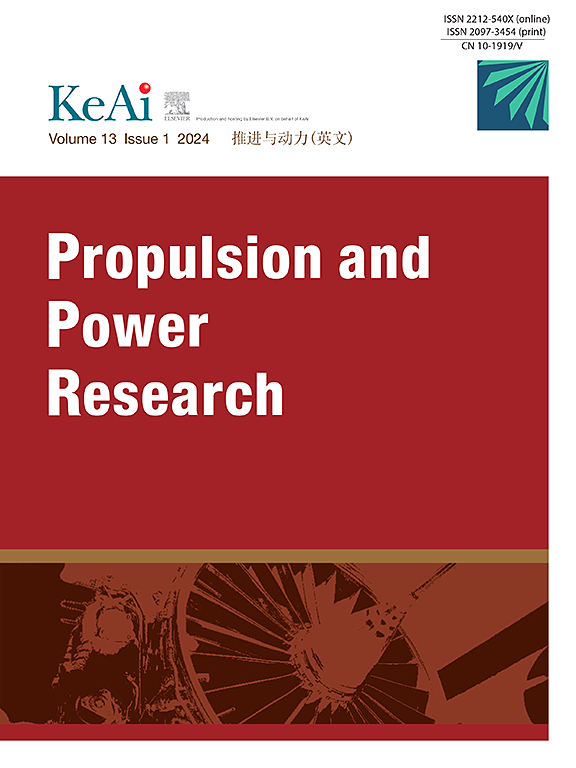Enriching various biodiesel feedstocks with Al2O3 nanoparticles in diesel engines: Performance, emissions, and exergy analysis
IF 5.4
2区 工程技术
Q1 ENGINEERING, AEROSPACE
引用次数: 0
Abstract
The inherent drawbacks of biodiesel, particularly its poor performance in cold climates, necessitate the use of nano-additives to improve its cold flow properties such as the cloud point (CP), pour point (PP), and cold filter plugging point (CFPP). In this study, transesterification was employed to produce methyl esters from waste cooking oil, corn oil, and jatropha oil. These biodiesels were blended with diesel fuel at a 20% biodiesel and 80% diesel volume ratio and enriched with nano-Al2O3 at concentrations of 25, 50, and 100 mg/L. The aim of this study is to evaluate the impact of nano-Al2O3 on engine combustion, performance, exergy, and emissions of diesel engines using different biodiesel feedstocks. The addition of nano-Al2O3 to methyl ester mixtures (JB20A100, CB20A100, and WB20A100) resulted in enhancements in thermal efficiency by 8%, 11%, and 13%, respectively. CO emissions were reduced by 12%, 17%, and 22% for jatropha, corn, and waste cooking oil blends, respectively, with 100 ppm alumina. This reduction in CO emissions can be linked to the enhanced oxidation process facilitated by the high surface area of the nanoparticles, which act as catalysts, promoting more complete combustion. Similarly, UHC emissions decreased by 14%, 18%, and 23%, and smoke concentrations were significantly reduced by 14%, 17%, and 24% across the biodiesel blends. However, the introduction of alumina led to the rise in NOx emissions by 9%, 15%, and 19% for JB20A100, CB20A100, and WB20A100, respectively. The study also revealed increases in cylinder pressure by 2%, 4%, and 8%, and maximum heat release rates by 3%, 6%, and 10% for JB20, CB20, and WB20, respectively, upon the incorporation of 100 ppm Al2O3. Exergetic efficiencies improved by 6%, 17%, and 23% for JB20A100, CB20A100, and WB20A100, respectively, and the sustainability index showed enhancements of 2%, 4%, and 7%. Among the tested blends, WB20 with 100 ppm of nano-Al2O3 demonstrated the most promising results, significantly improving engine exergy, combustion, and performance while mitigating emissions to acceptable levels. This study underscores the potential of nano-additives to advance the sustainability and efficiency of diesel engine operations, particularly in cold climate.
用Al2O3纳米颗粒在柴油发动机中富集各种生物柴油原料:性能、排放和火用分析
生物柴油固有的缺点,特别是其在寒冷气候下的不良性能,需要使用纳米添加剂来改善其冷流动性能,如浊点(CP)、倾点(PP)和冷过滤器堵塞点(CFPP)。本研究以废食用油、玉米油和麻疯树油为原料,采用酯交换法制备甲酯。这些生物柴油分别以20%的生物柴油和80%的柴油体积比与柴油混合,并在浓度为25、50和100 mg/L的纳米al2o3中富集。本研究的目的是评估纳米al2o3对使用不同生物柴油原料的柴油发动机的燃烧、性能、能源和排放的影响。在甲酯混合物(JB20A100、CB20A100和WB20A100)中加入纳米al2o3,热效率分别提高了8%、11%和13%。含有100 ppm氧化铝的麻疯树、玉米和废食用油混合物的CO排放量分别减少了12%、17%和22%。一氧化碳排放量的减少可能与纳米颗粒的高表面积促进了氧化过程的增强有关,纳米颗粒作为催化剂,促进了更完全的燃烧。同样,混合生物柴油的UHC排放量分别下降了14%、18%和23%,烟雾浓度分别显著降低了14%、17%和24%。然而,氧化铝的引入导致JB20A100、CB20A100和WB20A100的氮氧化物排放量分别增加了9%、15%和19%。该研究还表明,在加入100 ppm Al2O3后,JB20、CB20和WB20的气缸压力分别增加了2%、4%和8%,最大放热率分别增加了3%、6%和10%。JB20A100、CB20A100和WB20A100的用能效率分别提高了6%、17%和23%,可持续性指数分别提高了2%、4%和7%。在测试的混合物中,纳米al2o3含量为100 ppm的WB20表现出了最有希望的效果,显著改善了发动机的燃烧、燃烧和性能,同时将排放降低到可接受的水平。这项研究强调了纳米添加剂在提高柴油发动机运行的可持续性和效率方面的潜力,特别是在寒冷气候下。
本文章由计算机程序翻译,如有差异,请以英文原文为准。
求助全文
约1分钟内获得全文
求助全文
来源期刊

Propulsion and Power Research
Multiple-
CiteScore
7.50
自引率
5.70%
发文量
30
期刊介绍:
Propulsion and Power Research is a peer reviewed scientific journal in English established in 2012. The Journals publishes high quality original research articles and general reviews in fundamental research aspects of aeronautics/astronautics propulsion and power engineering, including, but not limited to, system, fluid mechanics, heat transfer, combustion, vibration and acoustics, solid mechanics and dynamics, control and so on. The journal serves as a platform for academic exchange by experts, scholars and researchers in these fields.
 求助内容:
求助内容: 应助结果提醒方式:
应助结果提醒方式:


